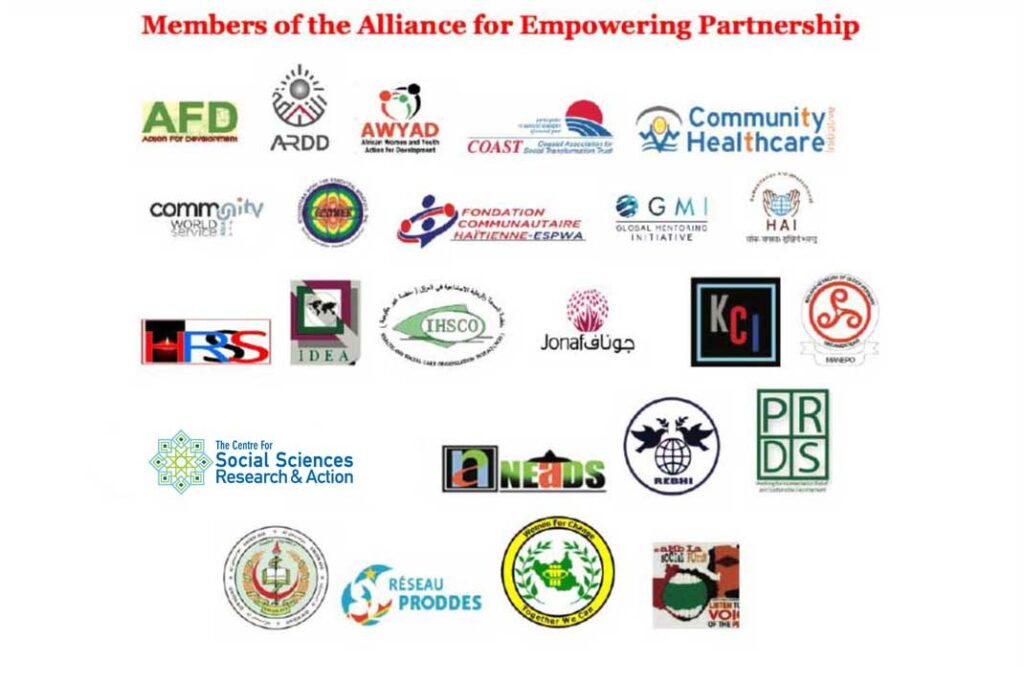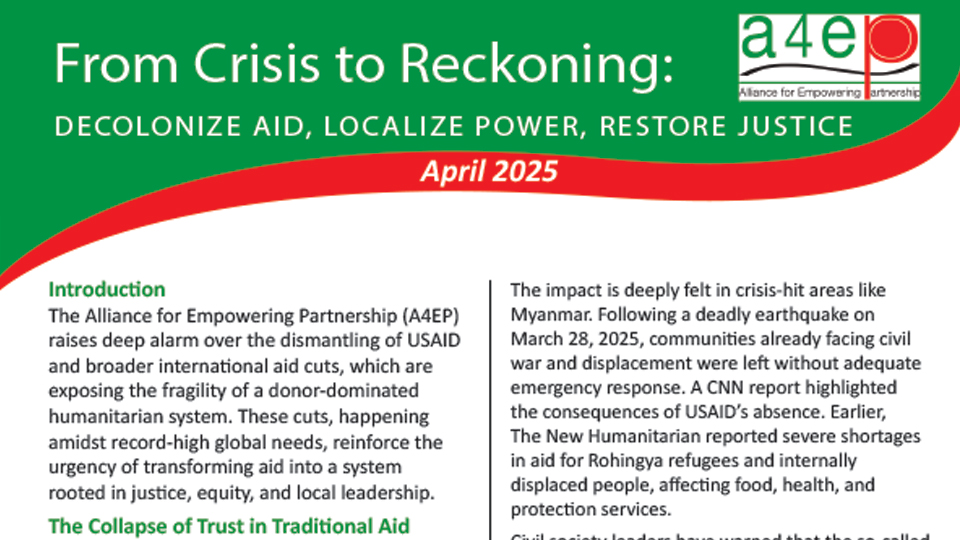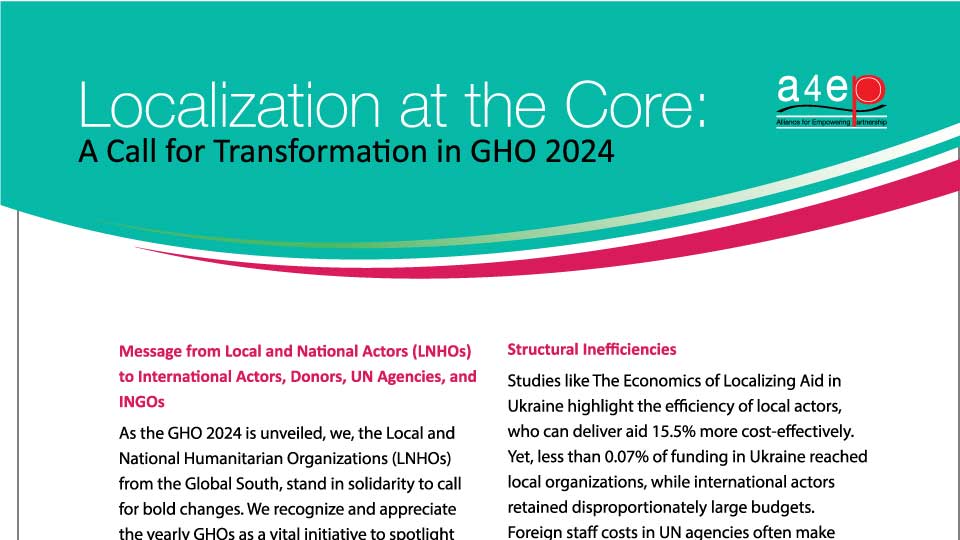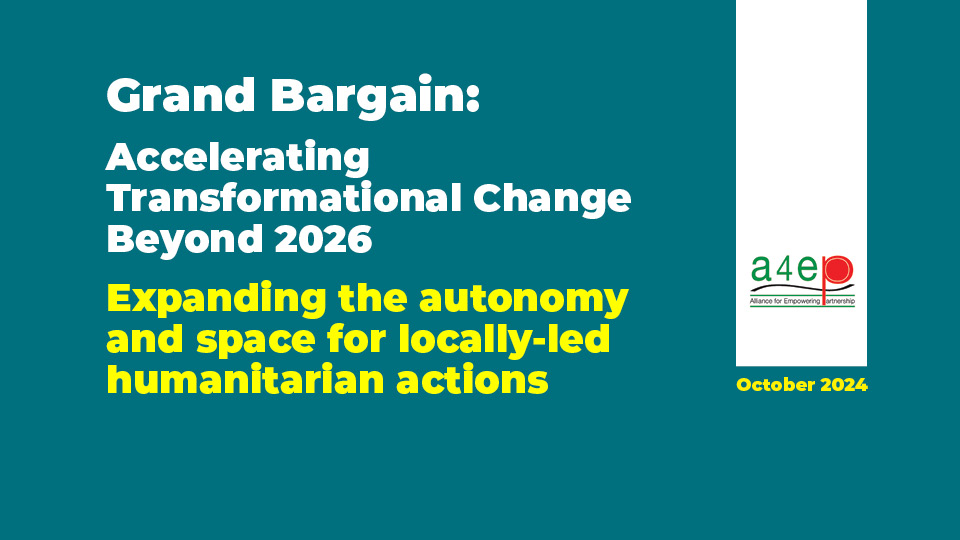From Crisis to Reckoning: Decolonize Aid, Localize Power, Restore Justice
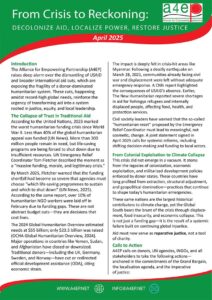
Download Report
Introduction
The Alliance for Empowering Partnership (A4EP) raises deep alarm over the dismantling of USAID and broader international aid cuts, which are exposing the fragility of a donor-dominated humanitarian system. These cuts, happening amidst record-high global needs, reinforce the urgency of transforming aid into a system rooted in justice, equity, and local leadership.
The Collapse of Trust in Traditional Aid
According to the United Nations, 2023 marked the worst humanitarian funding crisis since World War II. Less than 40% of the global humanitarian appeal was funded (UN News). More than 300 million people remain in need, but life-saving programs are being forced to shut down due to insufficient resources. UN Emergency Relief Coordinator Tom Fletcher described the moment as a “massive funding, morale, and legitimacy crisis.”
By March 2025, Fletcher warned that the funding shortfall had become so severe that agencies must choose “which life-saving programmes to sustain and which to shut down” (UN News, 2025). According to the same report, over 10% of humanitarian NGO workers were laid off in February due to funding gaps. These are not abstract budget cuts—they are decisions that cost lives.
The 2024 Global Humanitarian Overview estimated needs at $55 billion; only $23.5 billion was raised (OCHA Global Humanitarian Overview, 2024). Major operations in countries like Yemen, Sudan, and Afghanistan have closed or downsized. Traditional donors—including the UK, Germany, Sweden, and Norway—have cut or redirected official development assistance (ODA), citing economic strain.
The impact is deeply felt in crisis-hit areas like Myanmar. Following a deadly earthquake on March 28, 2025, communities already facing civil war and displacement were left without adequate emergency response. A CNN report highlighted the consequences of USAID’s absence. Earlier, The New Humanitarian reported severe shortages in aid for Rohingya refugees and internally displaced people, affecting food, health, and protection services.
Civil society leaders have warned that the so-called “humanitarian reset” proposed by the Emergency Relief Coordinator must lead to meaningful, not cosmetic, change. A joint statement signed in April 2025 calls for systemic reforms, including shifting decision-making and funding to local actors.
From Colonial Exploitation to Climate Collapse
This crisis did not emerge in a vacuum. It stems from the legacies of colonization, economic exploitation, and militarized development policies enforced by donor states. These countries have long profited from extraction, structural adjustment, and geopolitical domination—practices that continue to shape today’s humanitarian emergencies.
These same nations are the largest historical contributors to climate change, yet the Global South bears the brunt of the crisis through displacement, food insecurity, and economic collapse. This is not just a funding gap—it is the result of a systemic failure built on continuing global injustice.
Aid must now serve as reparative justice, not a tool of charity.
Calls to Action
A4EP calls on donors, UN agencies, INGOs, and all stakeholders to take the following actions—anchored in the commitments of the Grand Bargain, the localisation agenda, and the imperative of justice:
- Acknowledge and Address Structural Harm
- Recognize the historic and structural roots of today’s crises, including colonialism, forced underdevelopment, and climate injustice.
- Fulfill moral and financial obligations through legally binding climate finance, loss and damage mechanisms, and reparative justice frameworks.
- Cancel unsustainable debt and adopt economic measures that support community resilience and sovereignty.
- Shift Power and Resources to Local Actors
- Deliver on the Grand Bargain commitment to channel at least 25% of funding directly to local and national actors—with increased transparency and accountability.
- Ensure funding is flexible, multi-year, and locally defined.
- Recognize and strengthen local leadership in needs determination, coordination, and response design—not just implementation.
- Protect and Expand Civic and Humanitarian Space
- Prioritize the safety, resourcing, and autonomy of civil society groups, social movements, and frontline responders—particularly in shrinking democratic and humanitarian spaces.
- End aid conditionalities that penalize political independence or suppress dissent.
- Defend human rights and humanitarian principles from politicization.
- Transform Aid Governance and Coordination
- Reform pooled funding mechanisms to ensure equitable access for local actors.
- Decentralize coordination systems to elevate national and local leadership.
- Rethink the role of intermediaries to reduce bureaucracy, promote transparency, and redirect value to communities.
- Institutionalize community-led, participatory funding models and ensure accountability flows downward to people affected by crises.
- Build Equitable and Resilient Local Systems
- Support South-South cooperation, mutual aid networks, and regional resilience frameworks.
- Fund grassroots resilience strategies that are led by communities and sustained beyond project cycles.
- Expand ethical, long-term financing pathways that reduce dependency and enable self-determined futures.
From Dependency to Self-Determination
The dismantling of USAID and wider donor pullouts are not isolated events—they expose deep flaws in the global aid system. This must be a moment of reckoning. The future of aid must be rooted in rights, not charity; justice, not dependency.
Please download the full report click hare
Alliance for Empowering Partnership (A4EP)
www.a4ep.net, [email protected] Twitter handle: @a4ep2
